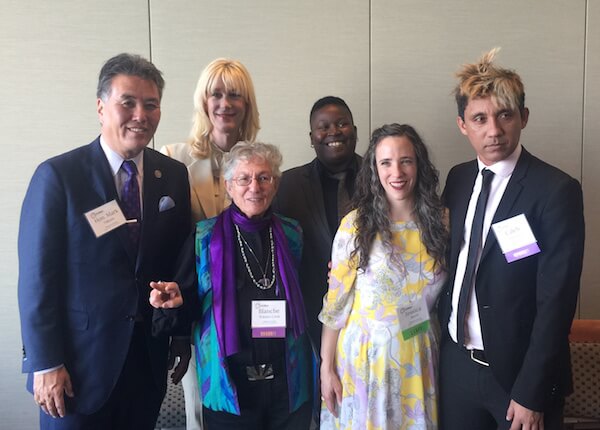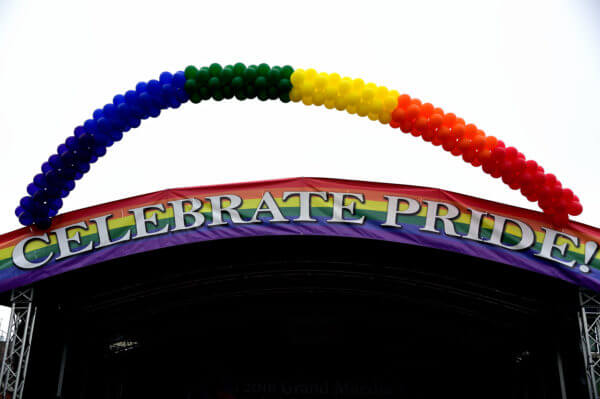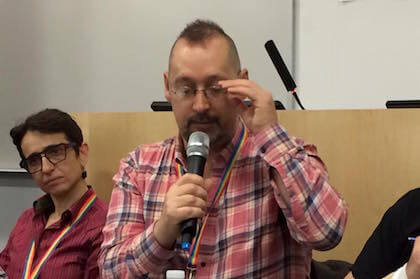Scott Long recovering in the hospital after a brutal June 9 attack on him. | SAMIR TAHA
Violence is always badly timed, but this was oddly unfortunate, coming during a celebratory weekend. Scott Long had just marked his birthday, and his roommate, Samir Taha, would soon be doing the same.
Instead, on Saturday, June 9, on his way home carrying a bag of party supplies, Long was attacked and beaten in Oakland, California. Long is known for his lengthy career as a human rights activist focused on LGBTQ issues, having worked with Human Rights Watch, the International Gay and Lesbian Human Rights Commission (now known as OutRight Action International), and other organizations.
According to Long, the attack occurred at around 10:30 p.m. on 35th Avenue in the city’s Laurel neighborhood. Long was hit from behind with what he believes was a tire iron.
Lucid and in good spirits when speaking with Gay City News, Long said, “Then he hit me with a second blow, right on the side of my head, which knocked my glasses off, and then he hit me at least two more times.” Of his attacker, Long said, “I only got an incomplete glimpse at him before I lost my glasses. He was white, possibly Latino,” of average height, in his 20s or early 30s, “wiry with black hair and a black T-shirt.”
Long-time LGBTQ international human rights activists believes attack was random
There was no clear motive for the attack. Long posted of the incident on his Facebook page, with many assuming it was a gay bashing or other hate crime, but Long does not know.
“He was saying, ‘You something,’ but honestly my ears were ringing,” he recalled. “I don’t think it was ‘You faggot’ or something else offensive, but honestly, I couldn’t understand it. At least he ran off and I don’t know why.”
Long also does not believe it was a robbery.
“He didn’t reach for my wallet,” he said.
Nor did the assailant try to take what he was carrying.
“I was going to have a surprise party for my roommate the next day, so I had a bag with two bottles of Champagne, which were broken. He didn’t grab at that.”
Long also does not believe it was an attack related to the increasing tensions that gentrification in Oakland is causing between new and old residents.
The incident caused severe damage to Long’s face, breaking his upper and lower jaws and knocking out his lower teeth, resulting in severe swelling. He was in the hospital for several days and underwent facial reconstructive surgery involving the placement of metal plates over the shattered jaw bones.
Long reflected on the incident with a surprising sense of humor, saying, “I am just recuperating from that. The surgery went well. I seem to be doing well. My face isn’t going to be the same, but it wasn’t that great a face to start with. Maybe some improvements might emerge.”
For his work as a human rights activist, Long has been to numerous countries known for their violence, including Egypt and Iraq. That the attack occurred in the US has a certain irony.
“Even though I have been in places of violence and counseled victims of violence, it is just very different when you are facing it yourself in that direct way,” he said, adding, “I think it’s right and it’s just that this should happen in Oakland. What someone who has been working internationally like me needs is a reminder — how brutal existence can be in the United States.”
The attack, according to Long, is “a reminder of the place we live in and what it is really like. But it’s ironic that we need sometimes a bash in the head to be reminded, because it is so easy to be ignorant here of the violence that is beneath the surface.”
Comparing the US with the countries where he has worked, Long said, “Egypt can be a place where there is an enormous amount of state violence, but there is not much social violence. It would unlikely that some ordinary guy would just beat me on the streets.”
He added, “I have been in countries where there is enormous social violence like Iraq, but I think what you see in the United States is that there is violence from society and violence from the state, and that’s a very dangerous conjunction.”
It is for this reason that Long was reluctant to contact police.
“I don’t want the police brought down on this guy or someone of color who was innocent,” he said. “And we only did call the police because I was thinking to myself, ‘He could easily beat somebody else with a tire iron on the head.’ I feel I am in a country where the level of state violence means that calling in the state after something like this is just inviting more violence, not a solution.”
No fan of the police, Long said he also believes in abolishing prisons. Still, he added, despite his distrust of the police and what he believes is simply the random nature of the attack, “Someone who has been gay-bashed or is fleeing an abusive husband, I would never say to them don’t call the police. It’s not a prescription I can urge on other people. It’s a personal stance with me.”
One important international LGBTQ fight Long was involved in was the 2001 Queen Nile Boat incident in which 52 Egyptian men were arrested and tortured. His long-time work in that country has led to speculation — which Long dismisses — that the attack was retribution.
“It didn’t make sense,” Long said when friends brought this possibility up. “It restores some logic to it, but I don’t think it’s that.”
He said while leaders like Russia’s Vladimir Putin go after regime critics outside of the country, Abdel Fattah el-Sisi, the current president of Egypt, is not known for launching attacks on human rights activists who are no longer in the country.
Long had moved back from Egypt to the US in 2016. Within the past nine months, he began living in the Bay Area, settling into Oakland. He has been working on a manuscript for a book on the LGBTQ international human rights movement due out early next year with Pluto Press and thought the Bay Area would be a calmer place than New York to continue his work.
The incident occurred only a few blocks from Long’s apartment in Oakland. Long said soon after the attack, “I just sort of dimly realized that I had my phone on me, so I called my roommate.”
Taha, originally from Egypt, commented that when he arrived, Long was “laying on the pavement bleeding so much. It was a terrifying scene.”
“It seems to me to be something about the dangers of living in the USA,” Taha said. “He just appeared out of nowhere. It is mind-boggling the kind of cruelty it takes to inflict this kind of pain on another human being.”
He added, “Scott’s work has helped so many people, and it is just horrifying to see someone who has done so much for other people go through this. Scott worked on Egypt when no one else was raising concerns about the LGBT question. Even mainstream human rights organizations shied away. It is different now but I have to say Scott had a part in that.”
Americans, Long said, need to understand how violent their own country is, even in relation to hot spots in the news.
“This is an increasingly violent world,” he said. “Of course, you work in Egypt, you work in Iraq, there is danger all around you. You can’t discount that. But I think that for me this is real blunt as a reminder that violence is here among us. It’s all over. It’s all around. So we have to figure out our own ethical, our own political, our own moral response to that.”
Taha and others are planning to hold a fundraiser in the near future for Long’s medical expenses. More details are available at Long’s Facebook page at facebook.com/scottlong1980.



































